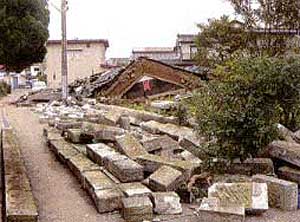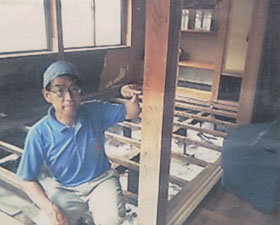Please view the following page for information on the earthquake, and how you can provide support. Thank you!
-
Quick Links
-
News Categories
Please view the following page for information on the earthquake, and how you can provide support. Thank you!
Today marks the first year since the massive earthquake and tsunami that hit Japan on March 11, 2011. The entire world was shaken by the news of this devastating natural disaster.
The earthquake was so intense that we could barely stand on our feet and the enormous tsunami that followed washed away towns along the northeastern coast, destroying everything and killing thousands of people. Even worse, it triggered the world’s worst nuclear crisis in history.
At that moment, we could do nothing but just stare at televisions feeling helpless and vulnerable to the power of Mother Nature. However, we knew that immediate action was needed to help Deaf survivors and announced a meeting with ZENTSUKEN and Japanese Association of Sign Language Interpreters (JASLI) to organize Central Headquarters for Disaster Relief for Deaf People in the Great East Japan Earthquake to respond to this disaster.
Thanks to all the supporters, we were able to provide relief goods, to dispatch sign language interpreters as well as to host events to encourage survivors and to offer emotional support service in the affected area.
We raised more than 60 million yen (USD 750,000) to support Deaf survivors through the generosity of friends from all over the world. I would like to take this opportunity to thank you for your contribution and encouragement.
Over the course of the year, it seems things are gradually settling down. However, many people still are going through a hard, tough time, some lost their job, some still live in temporary homes and some suffer from trauma. The journey to recovery has just begun and we are committed to support them until they get back their normal life.
As for relief funds, the fundraising target amount has not been achieved and we do not have enough funds to distribute necessary money for all the Deaf survivors. As the deadline for accepting donations has been extended, we ask your continuous support for our relief efforts.
We cannot recover everything which was lost by this tragedy, but we will stand by the people from the disaster-stricken areas and continue to support them until they recover their physical and emotional health and get back their normal lives with a safe place to live and a decent job before the earthquake and tsunami.
Although it is expected that recovery will take many years, we will dedicate ourselves to help them as long as we are needed. Your continued support and contribution will be greatly appreciated. Thank you.
March 11, 2012
Fujisaburo Ishino
Chief, Great East Japan Earthquake Central Headquarters
(post updated July 4th, 2011)
Dear all concerned,
We highly appreciate your sincere concern and condolences to the people affected by the Earthquake and Tsunami which hit the Tohoku area in Japan on March 11, 2011.
We are currently accepting donations by bank transfer and credit card. Donated funds will be used for support of the Deaf and deaf-related people, the cost for sign language interpreters, notetakers, Deaf counseling, medical professionals, volunteers and other necessary materials.
Please find information necessary for donating here. Your support is greatly appreciated.
If you have any questions, please contact us via our contact form.
Dear All,
First of all, we would like to express our sincere gratitude to all of you for showing your heartfelt concerns and condolences in the extremely difficult time.
We, the Japanese Federation of the Deaf, have already launched the “Headquarters for Disaster Relief for deaf people in the Great East Japan Earthquake”. We are doing our utmost to gather information about deaf victims and support of them, and providing it on our main website.
We have created an English page with information on the earthquake, including details on where to send donations:
Earthquake Information in English: http://www.jfd.or.jp/en/quake2011
We cordially ask you to refrain from directly contacting the disaster-stricken area about donations and volunteering.
Thank you for understanding.
Best regards,
Japanese Federation of the Deaf
from 1 December 2009 Issue of Japanese Deaf News, JFD’s monthly newspaper:
The members of a sign language club of Tsuru, Yamanashi, produced an emergency badge for deaf people.
The deaf badge, with a green, cut-out felt cloth butterfly placed on a yellow circle, is designed to be worn like an athlete number singlet, so that the surrounding people can identify the deaf person on the spot. The butterfly ID is taken from “Hearing Disability Badge,” designated to the wide mirror using drivers with hearing impairment. This handmade badge by Ms. Junko Kato, president of Senbakai, Tsuru sign language club, was utilized in the Tsuru Citywide Emergency Drill held on September 27, 2009.
The second training session of the annual drill since last year was conducted on the communication with people with hearing impairments, including writing text on the ground and using a cell phone. Feedbacks from the participants include, “I was thinking that sign language is the only means to communicate with deaf people, but today I learned there are many other communication strategies and tips”. Prior to the training session, flyers created by Senbakai were distributed, covering the information on the communication tips with deaf people and sign language grocery in case of emergency.
The city of Tsuru does not have a deaf association, and some deaf residents of this area are registered members of the provincial subdivision of the Yamanashi-ken (prefecture/state) deaf association. In the emergency drill, seven from the deaf association and three from Senbakai participated.
from 1 August 2007 Issue of Japanese Deaf News, JFD’s monthly newspaper:
Disrupted Lifeline
 On July 16, 2007, at about 10:13 in the morning, a strong earthquake originating off the Chuetsu coast hit Niigata Prefecture on the opposite side of Japan from Tokyo. Strong quakes over the Japanese scale of 6+ were recorded in Kariu Village in Kashiwazaki City, Niigata Prefecture and in Iizunacho in Nagano Prefecture. Damages were largest around Kashiwazaki City, where many houses throughout the city collapsed. After the earthquake, major lifelines supplying electricity, gas and water were cut off, and fax and emails were not working. No casualties of the Deaf were reported in Nagano Prefecture.
On July 16, 2007, at about 10:13 in the morning, a strong earthquake originating off the Chuetsu coast hit Niigata Prefecture on the opposite side of Japan from Tokyo. Strong quakes over the Japanese scale of 6+ were recorded in Kariu Village in Kashiwazaki City, Niigata Prefecture and in Iizunacho in Nagano Prefecture. Damages were largest around Kashiwazaki City, where many houses throughout the city collapsed. After the earthquake, major lifelines supplying electricity, gas and water were cut off, and fax and emails were not working. No casualties of the Deaf were reported in Nagano Prefecture.
Buried Underneath the Furniture
Mr. and Mrs. Kimura experienced the earthquake while at home in Kashiwazaki City. Mitsu Kimura’s legs were caught underneath the PC rack which fell on her, but narrowly escaped using her hands. Yoshifumi, her husband was totally buried under the large set of drawers and only his hands could be seen. Mitsu desperately asked for help from neighbors by using gestures and finally managed to get him out.
from 1 August 2007 Issue of Japanese Deaf News, JFD’s monthly newspaper:
No positive response to request from the Deaf after the Chuetsu earthquake –
Another request made by the Japanese Federation of the Deaf
NHK (Japan Broadcasting Corporation) started to broadcast emergency broadcasting right after the Chuetsu earthquake but there was neither captioning nor sign language interpretation on these broadcasts, nor was there any new in sign language.
The Japanese Federation of the Deaf (JFD) was concerned that the request they had sent to NHK after the Noto Peninsula earthquake on March 25, 2007 had been neglected and commented that Deaf persons had been watching TV screens just to increase their anxiety. JFD sent a request again on July 18, 2007 to NHK, stating that, as a public broadcasting station, NHK should provide sign language interpretation and captioning on emergency broadcasting.
Deaf persons can not receive information through audio broadcasting. Information on evacuation, aftershocks, rescue, recovery and weather is vital to victims in the affected areas. JFD also sent a request letter to the local TV station in Niigata to ensure information access for the Deaf.
from August 2004 Issue of Japanese Deaf News, JFD’s monthly newspaper:
Mobile phones prove to be most useful, and fax machines less so
A torrential rainfall caused by the active seasonal rain front ravaged three prefectures of Niigata, Fukushima and Fukui. As of July 26, it is confirmed that there were no injuries to any Deaf people or to sign interpreters. 28 families of the Deaf in Niigata and Fukushima, were however, reported to be flooded above or below floor level.
Spending a night on top of a car roof

In Niigata Prefecture, damages concentrated in the cities of Sanjo and Mitsuke, and the town of Nakanoshima. Casualties among the Deaf were 16 floodings above floor level and 2 below. Many Deaf people live in Sanjo City. Every road there was covered with water up to knee or to chest level and roads leading to Sanjo were so congested that it was difficult to reach the devastated area. In such circumstances, leaders of the local sign language study group took the initiative in confirming the safety of the Deaf in the community.
Many facsimile machines went underwater and became useless, while sending and receiving text messages through mobile phones proved most useful in confirming safety and exchanging information. On the other hand, people without mobile phones spent worrisome days, not having means to communicate with others.
The first floor of the home of Mr Katsuya Haga, chairman of Sanjo Deaf Welfare Society, was flooded. A new facsimile machine was brought to his home by the Niigata Deaf Association. A deaf person who spent a night on the roof of his car submerged underwater said, “My wet body became cold and it was scary because it was so dark around.”